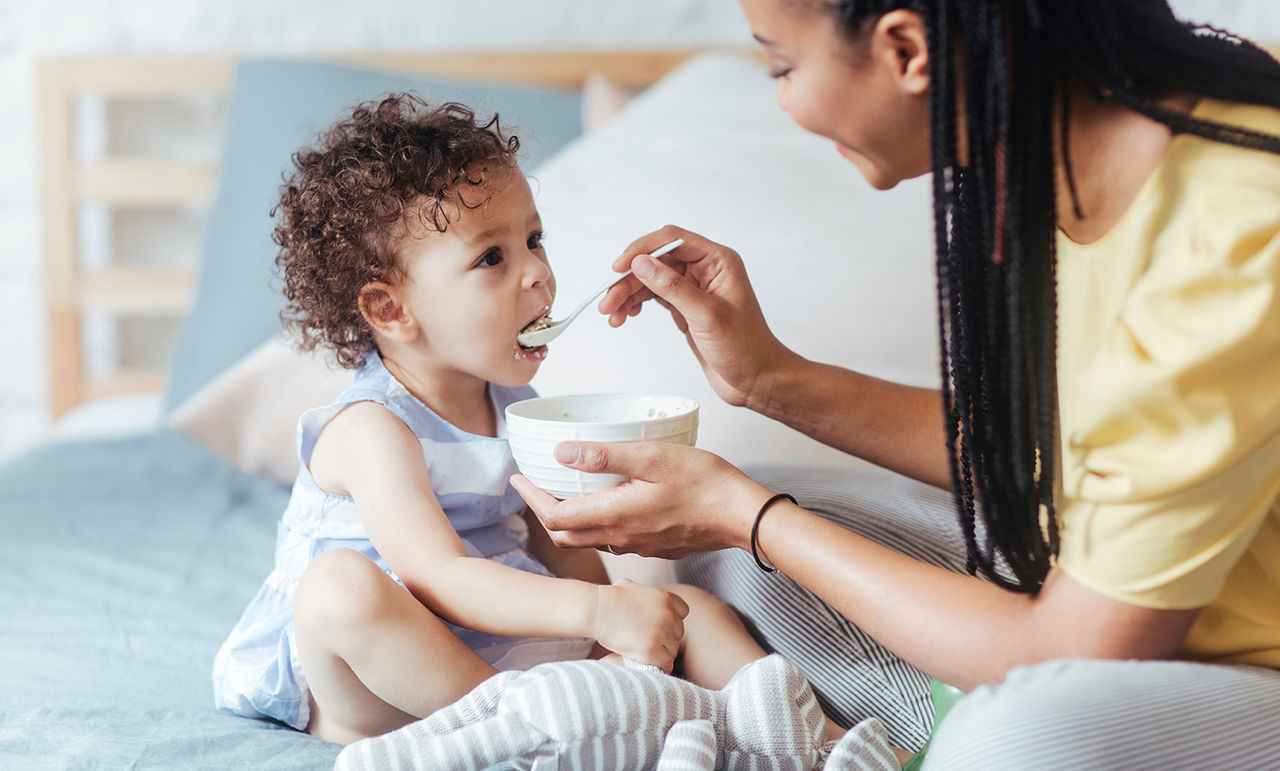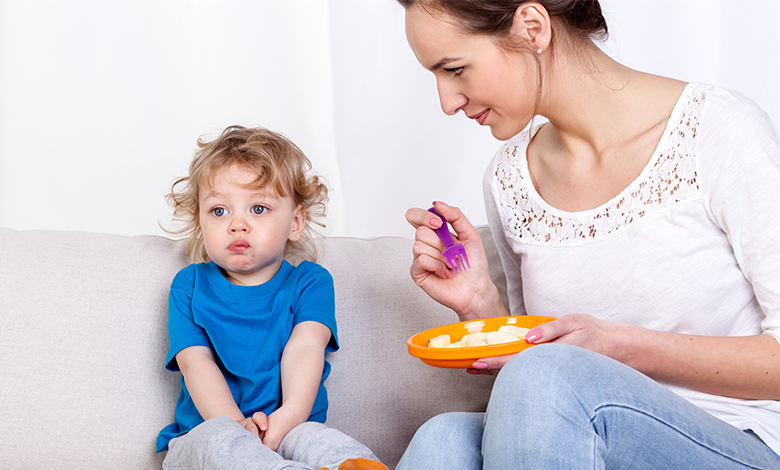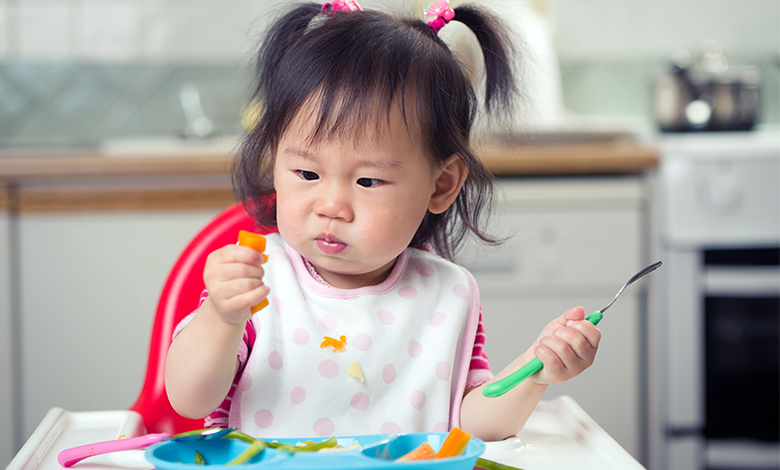- Fine motor skills and walking abilities are developing nicely.
- Solid foods are eaten across three meals.
- Most babies reduce their daytime sleep to one nap, or two at most, over 3 to 4 hours.
- Your little one is building an understanding of the world around them!
Your Baby's 11 Month Developmental Milestones

Key points
With each passing day, you are one step closer to celebrating a whole year of watching your little one grow and explore the world. Before you can celebrate their first birthday party, however, it is time to celebrate the 11 month old milestones they are likely to achieve before then.
The toddler phase is right around the corner and your baby's development is showing this off by increasing their vocabulary and motor skills. Over the past several months your baby has built strong foundations for key skills like standing, talking, walking, and empathising with others. The 11 month mark is when many of the past few months' skills come to fruition, the details of which will be outlined in this article.
Read on to learn more about which of your baby's milestones you can look forward to this month!
Over the past few months, your baby has slowly increased the amount of solid foods they have consumed daily. By the 11 month old mark, your little one is likely eating three meals a day, along with the occasional snack.
Their feeding times have generally settled by this age, making it easier to predict when a meal is needed. This means you can start to organise family meals, whether it’s sharing food together, or enjoying the opportunity to bond with your child during mealtime. These bouts can also benefit your baby's eating habits as they watch others around them use cutlery and crave the same independence. This often means that many babies learn how to use a spoon or an open cup rather than solely a sippy cup at this age. Their increased control over their motor functions also allows many babies to confidently practise both finger and self-feeding.
The stronger focus on self-feeding also extends to how much you should feed your baby. At this age you may allow them to take the lead when it comes to how much they eat, providing a range of options and more food if necessary. It may take some time or a few tries for your baby to enjoy a new food, especially if they are a fussy eater, so remain patient and offer a variety. So long as your baby's weight is in a healthy range and you are supplying them with sufficient nutrients, you can allow them to take the lead when it comes to meals.
Although their skills in eating new foods have developed significantly in recent months, you still need to be careful about what you are feeding your baby. Choking hazards are still prevalent, especially large pieces of round food. That is why it is still crucial to supervise your little one while eating, so that they are sitting upright, and their food is appropriately sized.
Breastfeeding
Solids may have taken the lead when it comes to your baby's eating habits, but the continued importance of breast milk is still relevant at 11 months. Feeding your baby breast milk can help support your baby's growth and nutrition, but the exact amount will depend on your baby's needs.
Water is still one of the only other liquids to be consumed at this age. While fun drinks like juice may be enjoyable for your little one, they do not offer the nutrients they need at this age. It is also crucial to refrain from offering your baby cow's milk as a main drink at this age. At 11 months old, do not give your infant liquids other than water, breast milk or formula.
Your baby's sleep schedule is likely to have slowly settled into a pattern over the past few months. While there is a chance your little one may experience a sleep regression during this age, it is also just as possible that they experience no issues with sleeping.
How much sleep your baby needs during the daytime can be fairly flexible, but most babies only need 3-4 hours. This may be accomplished in one or two naps, depending on your baby's preferences and sleep habits. Some little ones may begin fighting naps altogether during this month, but remaining persistent with their routine will benefit your baby's health greatly.
There is plenty to look forward to when it comes to an 11 month old baby and their developmental milestones. Your baby's development may hit long-anticipated milestones around getting into a standing position and walking assisted. They may also develop more complex communication skills, all of which are exciting for any parent.
Physical
Physical development for an 11 month old baby typically features improvement in their coordination and strength. Your baby may be pulling themselves upright and walking around by pulling on furniture, a skill referred to as 'cruising'. It is also possible for babies at this age to begin standing and walking independently, although they are more likely to prefer to crawl.
On top of walking, 11 month old babies may also find themselves coordinated enough to take charge of feeding themselves. Self-feeding becomes more common and some even begin attempting to drink from a sippy cup by themselves. This particular skill may take some time to develop so you may see several dropped cups in your future.
All babies move at their own pace, so be sure to remain patient and support your little one during their attempts at mastering physical skills.
Cognitive
At this age, the cognitive development of babies focuses on enjoying sounds and images in the world around them. You may notice your baby getting excited over music and toys that make noise, as well as pictures in books. Be sure to support this interest and incorporate their favourite aspects into playtime.
Emotional
When it comes to your baby's emotional development at 11 months of age, empathy is one of the more prominent skills they may be demonstrating. They may react to others' distress and try to offer comfort as they have been taught by those around them.
Babies at this age typically feel their most confident and comfortable when playing around you. However, they still may come to you for reassurance before going back to exploring.
Communication
Language development around this stage begins to speed up significantly for many babies. Their vocal attempts may begin to sound like the beginning of multiple words. Supporting them in their communication skills can help this learning process. Beyond encouraging their babble, you can support them by reading, singing, or talking to them. The combination of hearing words on a daily basis and being encouraged to respond will build their communication skills.
Communication is possible through other means as well, with some babies relying on pointing, waving, grunting, and nodding to get their meanings across. This level of communication often comes with a greater understanding of what others are saying, with some understanding of simple instructions. For example, some babies will become capable of cooperating with your efforts to dress them.
With this greater understanding comes the need to start setting boundaries. You may begin to teach your baby what is right and wrong, while also telling them 'no' for dangerous things.
Social
Although some little ones may still be dealing with separation anxiety at this age, others begin feeling more confident in being away from their parents. Allow them to explore their limits and remain close by for monitoring and moral support.
Milestones to monitor
Each child's development is unique, no matter what age they are. However, you may want to contact your doctor or child health or Well Child nurse if you notice your 11 month old baby is not:
● Making any eye contact.
● Making any sounds or babbling when someone talks to them.
● Comforted by you or other close carers.
● Moving or sitting at all.
● Happy to see people they know and love.
Your baby's development does not have to be all work, sleep and eating. Play is just as crucial for developing core skills such as hand-eye coordination or language skills, regardless if you are playing for hours or a short bout after your baby wakes up.
Just as you let your baby eat as much as they like, it is important to let them play how they want to for their development. This is because every new experience and time spent practising will allow your baby to master physical skills, gain a sense of their body, and engage with the world around them.
Common ways to play with an 11 month old baby include:
● Tummy time to allow them to practise skills like crawling or pulling themselves upright.
● Singing songs, reading picture books, or performing hand-clapping games with them.
● Challenging their movement skills with texture, environmental, or physically demanding toys and objects. This can include sand pits or pull-along toys.
● Making bath time fun with floating toys and bubbles as they can now sit upright. Just be sure to never leave your baby unattended.
● Puzzles and cognitive activities.
● Drawing utensils and paper.
There is also a range of baby toys for practising different developmental skills or engaging certain areas of cognitive development. Seek out the ones that your baby loves most and be sure to play games with them regularly to practise their new skills. Role-play toys will begin to become a popular option during this time, so you may be looking forward to games of pretend soon.
Let your baby learn about the world around them, but be sure that they do it safely. Baby gates are a good investment if you have particular areas of the house you do not want little ones underfoot, or to block off dangerous areas like stairs. This can also ensure that they remain in the same room as you while exploring, but most children at this age still want to remain in their parents' sights; even when they are having fun.
11 month old babies become increasingly more curious and mobile with each passing day. This means parents are required to pay even closer attention to ensure that no choking hazard is ending up in their little one's mouth, or that they are not at risk of falling.
Some concerns you may have to consider for your baby's wellbeing include:
● Falling from furniture, stairs, or other heights.
● Sticking objects into electrical outlets.
● Placing things into their mouth due to curiosity or teething pain, potentially choking or ingesting unhealthy substances.
● Walking on painful or dangerous objects.
Many of these concerns and others can be resolved by successfully baby-proofing your home and installing safety measures. Softening the corners of furniture, placing baby gates around hazards, or covering outlets can help keep your baby happy and healthy. It is also important to keep your attention on your little one at all times while remaining supportive of their explorations. Just be sure to put some shoes on their feet if they decide to take their explorations outdoors.
At the end of the month, you may need to look into booking your baby's 12 month vaccinations. Their health needs to be at its peak before they can enjoy their first birthday and all of the new developments that come with it.
Self-care tips for parents
Between taking care of your little one and the household, it is important to not forget about taking care of yourself. Everyone deserves a chance to rest and recuperate, especially when your baby decides to become mobile, requiring constant observation.
Self-care is what allows many parents to remain on top of everything in their lives, including an active baby. You can treat yourself even with a baby in your home by trying some of the following methods:
● Getting as much sleep as possible. With your baby taking fewer naps during the day, there are fewer chances than in previous months to sleep during the day. However, many babies are more consistent at sleeping through the night, so be sure to head to bed not long after them to get enough rest.
● Regularly eat healthy foods and try exploring new and easy meal ideas to make cooking less of a chore. Focus on nutritional and high-protein foods to give you enough energy to keep up with your little one.
● Make some time for physical exercise to boost your mood and keep your body healthy.
● Socialise with family, friends, and other loved ones on a regular basis to take some time for yourself and connect with others. This can be through a simple video call or a weekly coffee meetup.
● Check-in with your emotional and mental wellbeing. Reflecting on your emotions can help you determine whether you need to reach out for assurance or help.
● Enjoy the things you love, whether that is hobbies, spending quality time with a partner, or binge-watching a good television show.
There are plenty of aspects and concerns to consider during an 11 month old baby's development. Your health and wellbeing is just as important as your baby’s, so taking care of yourself can ensure you are the best you can be for your baby!
We’re here to help
Our team of nutritionists, dietitians and midwives at Careline are healthcare professionals with big hearts. Specialising in infant and child health, they offer parents and carers, free nutrition, feeding and product advice and lots of moral support. Contact our Careline Experts by phone, LiveChat or email.
Always consult your doctor, midwife or healthcare professional for advice about feeding your baby.
Every feeding journey is unique
Not every parent can breastfeed. Not every parent can produce breast milk. No matter what choice you make, we will support your unique feeding journey.
We at Nutricia believe in providing the best nutrition for babies, which is why we recognise breast milk as uniquely superior for babies, it provides many benefits. It is important that mums have a healthy diet to support breastfeeding. A decision not to breastfeed, or partial bottle feed, may reduce breast milk supply making it difficult to reverse. The cost and social implications of using feeding methods should be considered. Always seek professional for advice about feeding your baby. Ensure formula is used as directed as improper use can affect baby’s health.
Please note: These articles are meant to give you a general sense of the growth and development of your newborn baby. However, it’s important to remember that every baby grows and develops at their own pace. This article is not a substitute for medical advice. Always speak to your healthcare professional about any concern you have concerning your child.
Raising Children Network. Learning to Feed Themselves [Internet]. [cited 2024 January 8]. Available from: https://raisingchildren.net.au/babies/breastfeeding-bottle-feeding-solids/solids-drinks/learning-to-feed-themselves
National Health and Medical Research Council - Department of Health and Ageing. Eat For Health: Infant Feeding Guidelines Summary [Internet]. [cited 2024 February 27]. Available from:
https://www.eatforhealth.gov.au/sites/default/files/files/the_guidelines/n56b_infant_feeding_summary_130808.pdf
Pregnancy, Birth & Baby. Baby's Growth and Development: 11 Months Old [Internet]. [cited 2024 January 8]. Available from: https://www.pregnancybirthbaby.org.au/babys-growth-and-development-11-months-old
Tresillian. Play: 9-12 Months [Internet]. [cited 2024 January 8]. Available from: https://www.tresillian.org.au/baby/play/9-to-12-months/
Better Health Channel. Child Safety at Home [Internet]. [cited 2024 January 8]. Available from: https://www.betterhealth.vic.gov.au/health/healthyliving/child-safety-at-home
Better Health Channel. Self-care support for parents and caregivers [Internet]. [cited 2024 January 8]. Available from: https://www.betterhealth.vic.gov.au/health/healthyliving/self-care-support-for-parents-caregiver-14

Get in touch with our Careline experts
When your little one is unhappy or unwell you want reliable support from a trusted source. Our Careline team of nutritionists, dietitians and midwives specialise in infant and child health, offering free nutrition, feeding and product information.



